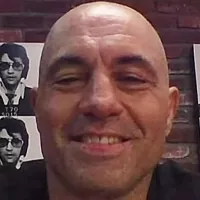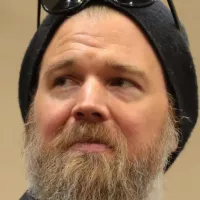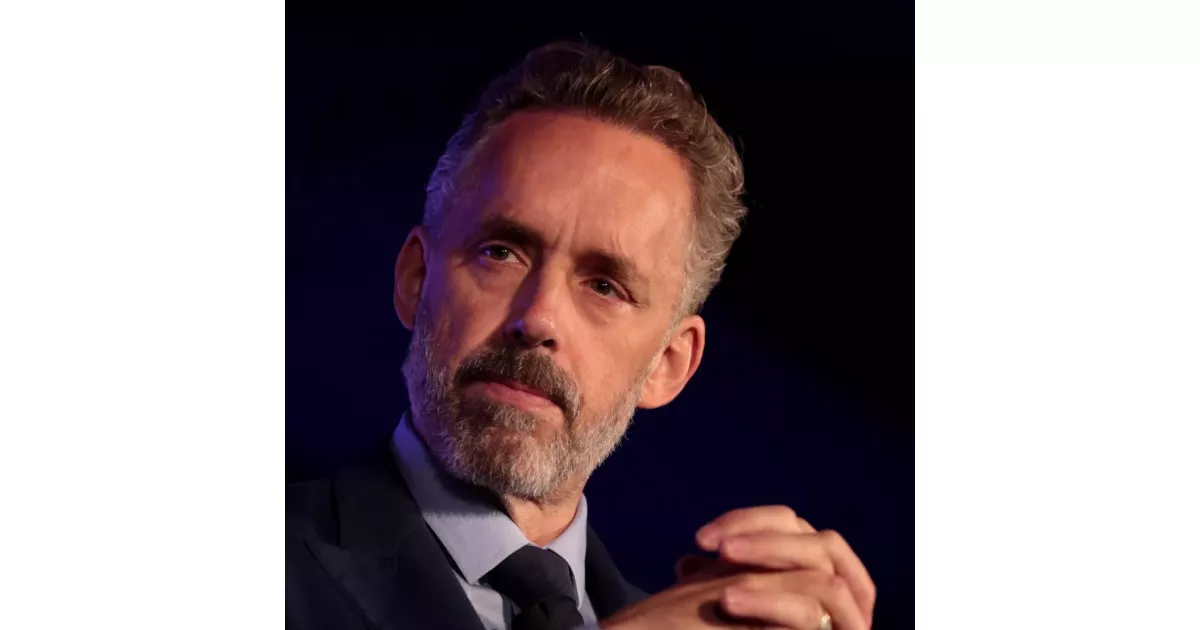Jordan Peterson is a Canadian psychologist, author, and media commentator known for his conservative-leaning views on cultural and political issues. While often described as conservative, Peterson identifies as a classical liberal and traditionalist. He gained prominence in the late 2010s, sparking significant debate and discussion.
June 1962: Jordan Peterson Born
In June 1962, Jordan Bernt Peterson was born. Peterson is a Canadian psychologist, author, and media commentator.
1979: Graduation from Fairview High School
In 1979, Peterson graduated from Fairview High School in Fairview, Alberta, and entered Grande Prairie Regional College.
1982: Bachelor of Arts in Political Science
In 1982, Peterson completed his Bachelor of Arts (BA) in political science from the University of Alberta.
1984: BA in Psychology
In 1984, Peterson received a BA in psychology from the University of Alberta.
1985: Move to Montreal and Attendance at McGill University
In 1985, Peterson moved to Montreal to attend McGill University, where he pursued a PhD in clinical psychology.
1989: Marriage to Tammy Roberts
In 1989, Peterson married Tammy Roberts. They have a daughter named Mikhaila, after Soviet leader Mikhail Gorbachev, and a son named Julian.
1991: PhD in Clinical Psychology
In 1991, Peterson earned his PhD in clinical psychology from McGill University.
June 1993: End of Post-Doctoral Fellowship
In June 1993, Peterson completed his post-doctoral fellowship at McGill's Douglas Hospital, working with Pihl and Maurice Dongier.
July 1993: Teaching and Research at Harvard University
From July 1993, Peterson taught and conducted research at Harvard University as an assistant professor in the psychology department.
June 1998: Departure from Harvard University
In June 1998, Peterson concluded his time at Harvard University and returned to Canada to become a professor at the University of Toronto.
1998: Return to Canada and Professorship at University of Toronto
In 1998, Jordan Peterson returned to Canada after researching and teaching at Harvard University and became a professor of psychology at the University of Toronto.
1999: Publication of Maps of Meaning: The Architecture of Belief
In 1999, Peterson published his first book, Maps of Meaning: The Architecture of Belief, which became the basis for many of his subsequent lectures. The book combined psychology, mythology, religion, literature, philosophy and neuroscience to analyze systems of belief and meaning.
2000: Collecting Soviet-era paintings
Around 2000, Peterson began collecting Soviet-era paintings.
2003: Appearance on Big Ideas
In 2003, Peterson appeared on TVOntario's "Big Ideas", speaking on subjects from a psychological perspective.
2004: Lecture series based on Maps of Meaning
In 2004, a 13-part lecture series based on Peterson's book "Maps of Meaning" aired on TVOntario.
2006: Second appearance on Big Ideas
In 2006, Peterson appeared for a second time on TVOntario's "Big Ideas".
2007: Commentary in BBC Horizon documentary
In 2007, Peterson provided commentary in the BBC Horizon documentary, "Mad but Glad", discussing the connection between pianist Nick van Bloss' Tourette syndrome and his musical talent.
2011: Appearance on The Agenda
From 2011, Peterson was featured as an essayist and panelist on TVOntario's "The Agenda", discussing psychologically relevant cultural issues.
2013: Registration of JordanPetersonVideos YouTube Channel
In 2013, Peterson registered a YouTube channel named JordanPetersonVideos, and immediately began uploading recordings of lectures and interviews.
2014: Uploading Recordings of University of Toronto Classes
From 2014, uploads to JordanPetersonVideos include recordings from two of his classes at University of Toronto ("Personality and Its Transformations" and "Maps of Meaning: The Architecture of Belief").
March 2016: Interest in Improving YouTube Content
In March 2016, Peterson announced an interest to clean existing content and improve future content on his YouTube channel, JordanPetersonVideos.
September 2016: Criticism of Bill C-16
In September 2016, Peterson released a series of videos criticizing Bill C-16.
2016: Honorary member of Kwakwakaʼwakw family
In 2016, Peterson became an honorary member of the extended family of Charles Joseph, a Kwakwakaʼwakw artist, and was given the name Alestalagie, meaning "Great Seeker".
2016: Criticism of Bill C-16
In 2016, Peterson released a series of YouTube videos criticizing a Canadian law (Bill C-16) that prohibited discrimination against gender identity and expression. This led to significant media coverage and controversy.
2016: Diet Restriction
In 2016, Peterson restricted his diet to only meat and a few vegetables in an attempt to control his depression and the effects of an autoimmune disorder.
2016: Prescription of Clonazepam
In 2016, Peterson was prescribed clonazepam for anxiety that reportedly began after a "violent reaction to a meat and greens only diet". The dose started at 0.5 mg/day.
January 2017: Increased funding through Patreon
In January 2017, Jordan Peterson's Patreon funding increased to $14,000 per month, enabling him to propose a number of projects and lecture series.
April 2017: Denied SSHRC Grant
In April 2017, Jordan Peterson was denied a Social Sciences and Humanities Research Council (SSHRC) grant, leading to claims of retaliation for his statements regarding Bill C-16.
May 2017: Spoke Against Bill C-16
In May 2017, Jordan Peterson spoke against Bill C-16 at a Canadian Senate Committee on Legal and Constitutional Affairs hearing as one of 24 witnesses invited to speak about the bill.
November 2017: Lindsay Shepherd Censure
In November 2017, Lindsay Shepherd, a teaching assistant at Wilfrid Laurier University, was censured for showing a clip of Peterson debating Bill C-16, sparking controversy. The censure was later withdrawn and the university apologized.
2017: Clinical Practice on Hold
In 2017, Peterson decided to put his clinical practice on hold due to new projects.
2017: Peterson's Religious Beliefs
In a 2017 interview, Peterson was asked if he was a Christian; he responded, "I suppose the most straight-forward answer to that is yes." When asked if he believes in God, Peterson responded: "I think the proper response to that is no, but I'm afraid he might exist." In a podcast with Douglas Murray and Jonathan Pageau, Peterson stated that God is the "ultimate fictional character" which is "at the top of the hierarchy of attention and action".
January 2018: Publication of 12 Rules for Life: An Antidote to Chaos
In January 2018, Penguin Random House published Peterson's second book, 12 Rules for Life: An Antidote to Chaos, which appeared on several best-seller lists.
February 2018: Agreement with the College of Psychologists of Ontario
In February 2018, Peterson entered into an agreement with the College of Psychologists of Ontario (CPO) after a professional misconduct complaint.
June 2018: Debate with Sam Harris
In June 2018, Bret Weinstein moderated a debate between Peterson and Sam Harris at the Orpheum Theatre in Vancouver regarding religion and God.
August 2018: YouTube Channel Growth
As of August 2018, Peterson's YouTube channel, JordanPetersonVideos, gathered more than 1.8 million subscribers and his videos received more than 65 million views.
August 2018: Peterson's Popularity Among Young White Men
In August 2018, Caitlin Flanagan of The Atlantic argued that Peterson is popular especially among young white men because of his opposition to identity politics.
2018: Temporary Stop to Teaching
As of 2018, Peterson temporarily stopped teaching.
2018: Publication of 12 Rules for Life: An Antidote to Chaos
In 2018, Peterson paused his clinical practice and teaching duties and published his second book, 12 Rules for Life: An Antidote to Chaos, which became a bestseller.
2018: Peterson Eats Only Beef, Salt, and Water
In mid-2018, Peterson stopped eating vegetables altogether and continued eating only beef, salt, and water.
March 2019: Cambridge University Rescinds Fellowship Invitation
In March 2019, Cambridge University rescinded a visiting fellowship invitation to Jordan Peterson, citing concerns over his association with a man wearing an Islamophobic shirt and the university's commitment to inclusivity.
2019: Health Problems Related to Benzodiazepine Dependence
In 2019, Peterson suffered health problems related to benzodiazepine dependence.
January 2020: Medically Induced Coma in Russia
In January 2020, Peterson flew to Moscow, Russia, after being unable to find North American doctors willing to place him into a medically induced coma as treatment for his addiction. Doctors in Russia reportedly diagnosed him with pneumonia in both lungs upon arrival and placed him into a medically induced coma for eight days, followed by four weeks in the intensive care unit, during which time he reported having suffered a temporary loss of motor skills.
March 2020: Investigation by the College of Psychologists of Ontario
In March 2020, the College of Psychologists of Ontario investigated statements made by Peterson, but concluded without making any orders.
June 2020: Public appearance after treatment
In June 2020, after several months of living in Belgrade, Serbia, Peterson made his first public appearance in over a year, appearing on an episode of his daughter's podcast recorded in Belgrade, at which point he was "back to [his] regular self".
August 2020: Contracted COVID-19
In August 2020, Peterson's daughter announced that her father had contracted COVID-19 during his hospital stay in Serbia.
November 2020: Penguin Random House Town Hall Criticism
On 23 November 2020, Peterson's publisher Penguin Random House Canada (PRH Canada) held an internal town hall where many employees criticized the decision to publish his book.
2020: Clonazepam dosage increase
By 2020, Peterson's clonazepam dose had increased to 4 mg/day. Peterson attributed his increased usage of clonazepam to his wife Tammy's diagnosis of kidney cancer.
2020: Health problems related to benzodiazepine dependence
In 2020, Peterson continued to suffer health problems related to benzodiazepine dependence.
2020: Analysis of Lion Diet
In 2020, a New Republic article by Lindsay Beyerstein analyzed Mikhaila's "lion diet", consisting entirely of beef, salt, and water, and promotion thereof, describing her as a "nutrition 'influencer' with no medical credentials".
March 2021: Release of Beyond Order: 12 More Rules for Life
On 2 March 2021, Peterson's third book, Beyond Order: 12 More Rules for Life, was released.
2021: Publication of Beyond Order, Resignation from University of Toronto, Return to Podcasting
In 2021, Jordan Peterson published his third book, Beyond Order: 12 More Rules for Life, resigned from the University of Toronto, and returned to podcasting.
2021: Retirement from the University of Toronto
In the fall of 2021, Peterson retired from the University of Toronto and became professor emeritus.
January 2022: ICRC investigation into public statements
In January 2022, some of the language used in Jordan Peterson's public statements was investigated by the ICRC.
May 2022: Chancellor of Ralston College
In May 2022, Peterson became chancellor of the newly launched Ralston College, an unaccredited liberal arts education project.
June 2022: Deal with The Daily Wire
In June 2022, Jordan Peterson signed a deal with The Daily Wire, granting them distribution rights to his video and podcast library, with plans to produce bonus content for DailyWire+.
June 2022: ICRC investigation into public statements
In June 2022, some of the language used in Jordan Peterson's public statements was investigated by the ICRC.
June 2022: Suspension of Twitter Account
On 29 June 2022, Peterson's Twitter account was suspended under the site's "hateful conduct policy" after posting a tweet misgendering and deadnaming transgender actor Elliot Page.
November 2022: Order for Remedial Program by ICRC
In November 2022, the ICRC ordered Peterson to complete a continuing education or remedial program regarding professionalism in public statements.
November 2022: Restoration of Twitter Account
Peterson's Twitter account was restored in November 2022 after Elon Musk acquired the company.
2022: Olivia Wilde's comments about Peterson
During a press tour to promote her 2022 film "Don't Worry Darling", Olivia Wilde said the sinister character Frank was inspired by Peterson, describing him as "this insane man, Jordan Peterson, who is this pseudo-intellectual hero to the incel community." Peterson responded to Wilde's statements calling the film "the latest bit of propaganda disseminated by the woke, self-righteous bores and bullies who now dominate Hollywood" and criticizing the term "incel".
2022: Labelled as Influential Public Intellectual
In 2022, Mick Brown wrote in The Daily Telegraph that Peterson "has become the most visible, outspoken and certainly the most polarising figure in the 'culture wars' between Left and Right, challenging the new orthodoxies of political correctness that have permeated academia, education, and political and cultural life."
2022: Appearance on The Joe Rogan Experience
In 2022, Peterson appeared on The Joe Rogan Experience podcast and made several controversial statements regarding climate change, denying the accuracy of climate modeling and confusing it with weather forecasting. He also cited Fred Singer and falsely asserted that fracking has not polluted water supplies. His statements were criticized by climate scientists such as John Abraham and Michael E. Mann.
2022: Chancellor of Ralston College
In 2022, Peterson became chancellor of the newly launched Ralston College, a private, unaccredited, liberal arts college in Savannah, Georgia.
2022: Initial decision by the College of Psychologists of Ontario
In 2022, the ICRC made its initial decision regarding Jordan Peterson's public statements.
June 2023: Founding of Alliance for Responsible Citizenship
In June 2023, Peterson, along with Baroness Stroud and John Anderson, founded the Alliance for Responsible Citizenship.
August 2023: Judicial Review Upholding CPO's Decision
In August 2023, Peterson's appeal was reviewed by the Ontario Divisional Court, who upheld the college's initial decision and ordered Peterson to pay legal costs.
November 2023: Alliance for Responsible Citizenship Conference
In November 2023, the Alliance for Responsible Citizenship, an organization affiliated with Peterson, held a three-day conference. Peterson stated that "We do not believe that humanity is necessarily and inevitably teetering on the brink of apocalyptic disaster." The conference hosted several speakers who downplayed the extent of anthropogenic climate change and promoted the use of fossil fuels. Attendee and biologist Jennifer Marohasy characterized the conference as a platform for spreading climate change denialism.
2023: Published A Conservative Manifesto
In 2023, Jordan Peterson published "A Conservative Manifesto", further solidifying his association with conservative ideology.
January 2024: Decision Upheld on Appeal
In January 2024, the decision was upheld on appeal to the Court of Appeal for Ontario.
August 2024: Supreme Court Declines Appeal
In August 2024, the Supreme Court of Canada declined to hear an appeal from the appeal court decision, closing Peterson's legal options for resisting the social media training.
October 2024: Trudeau's Statement and Potential Legal Action
In October 2024, Canadian prime minister Justin Trudeau said under oath that Peterson was funded by Russian state-owned media outlet RT. In response, Peterson said he was considering legal action.
November 7, 2024: Lawsuit Dismissed
On November 7, 2024, Jordan Peterson's lawsuit against Wilfrid Laurier University was dismissed by the court.
November 2024: Publication of We Who Wrestle with God: Perceptions of the Divine
Peterson's fourth book, We Who Wrestle with God: Perceptions of the Divine, was published on 19 November 2024, again by Penguin Random House.
November 24, 2024: Criticism in The Guardian
On November 24, 2024, Martha Gill in The Guardian criticized Jordan Peterson for tapping into the self-improvement market among young men and advocating a form of spirituality as a route, given that religion was in decline among members of that cohort.
2024: Launched Peterson Academy
In 2024, Jordan Peterson launched the Peterson Academy, an online education platform offering pre-recorded lectures.
2024: Publication of "We Who Wrestle with God"
In 2024, Peterson published "We Who Wrestle with God", an analytical reading of the Bible. The book received mixed reviews, with Christianity Today praising its exegesis but noting its slipperiness on theological truth, while The Times criticized it as unreadable and paranoid and The Guardian criticized Peterson's contempt for nuance and disagreement.
2024: Death of Walter Peterson and Beverley Peterson
In 2024, Walter Peterson and Beverley Peterson, Jordan Peterson's parents, passed away.
May 2025: Debate with Atheists
In May 2025, Peterson engaged in a debate with 20 atheists hosted by Jubilee Media. The debate, originally titled "1 Christian vs. 20 atheists", went viral on social media. During the debate, Peterson refused to identify as a Christian, leading to a title change to "Jordan Peterson vs. 20 atheists".
Mentioned in this timeline

Elon Musk is a businessman and entrepreneur who leads Tesla...

Joe Rogan is an American podcaster UFC color commentator comedian...

Justin Trudeau served as the rd Prime Minister of Canada...

Sony is a Japanese multinational conglomerate based in Tokyo Its...
The Guardian is a British daily newspaper founded in as...

News encompasses information about current events disseminated through various media...
Trending

14 minutes ago Demi Moore debuts dramatic bob haircut at Gucci show, sparking makeover buzz.
1 hour ago Hanfmann Advances in Santiago 2026 After Win, Set to Face Carabelli.
2 hours ago Lesotho: Frontliners help family overcome poverty; South Africa sees tourism boom in 2026.

2 hours ago Sara Eisen on The View: Tense Moments and Financial Expertise Displayed.

1 hour ago Griekspoor to face Medvedev in Dubai final: Highlights and predictions surface.

3 hours ago Ryan Hurst's Kratos Revealed in Prime Video's 'God of War' Series: Cast Updates
Popular

Jesse Jackson is an American civil rights activist politician and...

Barack Obama the th U S President - was the...

Susan Rice is an American diplomat and public official prominent...

Michael Joseph Jackson the King of Pop was a highly...

XXXTentacion born Jahseh Dwayne Ricardo Onfroy was a controversial yet...

Kashyap Pramod Patel is an American lawyer who became the...




